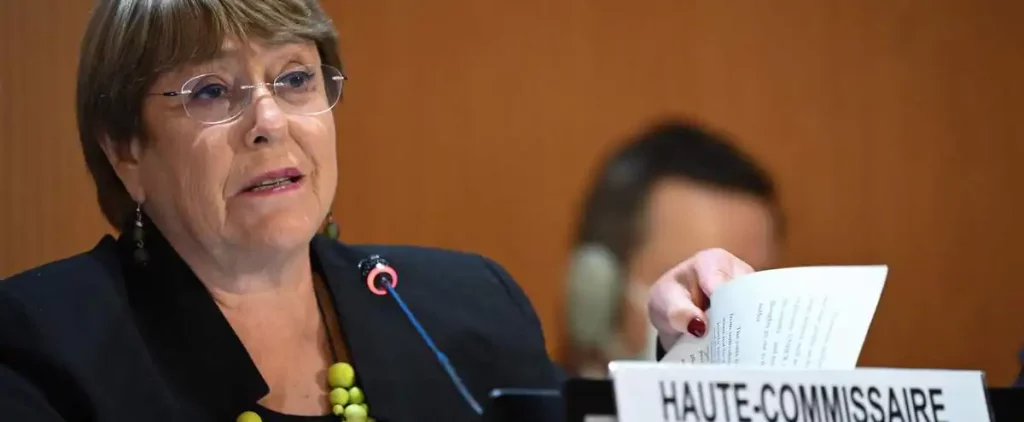
Beijing | The UN High Commissioner for Human Rights met with the Chinese Foreign Minister on Monday, hoping for her maximum access at the start of a visit to China dedicated to the treatment of Muslim minorities in Xinjiang.
Also read: Joe Biden in Tokyo: United States and Japan open up against Beijing
After years of tough talks with Chinese officials, 70-year-old Michelle Bachelet, the former president of Chile, has to stay in the country for six days until Saturday.
“I look forward to interacting with many people during my visit. I will discuss the most important and sensitive issues. I hope it helps us build confidence, ”said Mr.Me Bachelet during a meeting with Chinese Foreign Minister Wang Yi in Guangzhou.
Diplomatic sources told AFP that she spoke via videoconference Monday with representatives of about 70 foreign embassies in China.
According to these sources, Michelle Bachelet promised that diplomats would be given access to detention centers and talk to local human rights activists.
The UN has been suspended from 2018 with Beijing to allow “free and meaningful access” to Xinjiang.
Authorities have long blamed the region on attacks by separatists and Uyghur Islamists. It has been the subject of intense surveillance for many years under the name of anti-terrorism.
Studies have shown that China detains at least one million Uyghurs and other members of the Muslim minority in re-education camps and even imposes forced labor. Beijing has denied the allegations.
M visit.Me Bachelet was the first person to serve as High Commissioner for Human Rights in China since 2005.
She had to travel specifically to Urumqi, the capital of Xinjiang, as well as to Kashgar, south of the Uyghur-populated region.
“Closed circuit”
Michelle Bachelet will meet with “many senior executives at the national and local levels,” “civil society organizations, business world representatives and academics,” her cabinet assured.
Due to the outbreak, the visit will take place in a “closed circuit,” the health bubble, Chinese diplomatic spokesman Wang Wenbin told reporters on Monday.
For the same reason, he said, the High Commission and China had “decided after negotiations” not to include journalists in the delegation.
The lodge, however, was closely watched, and many feared that China would use the visit to clear the charges against it.
Washington-based human rights group Chinese Human Rights Defenders (CHRD) said on Monday that Beijing “carefully manages and choreographs” its visit.
The NGO underlines that “we fear (…) that you have no free access to victims, witnesses, and independent members of civil society” and that “your views have been distorted by the Chinese government”.
The United States, which has accused China of being a “carnage” and MMe Bachelet, for his “continued silence” when confronted with “atrocities”, said he was “concerned” about the visit.
“We do not expect the People’s Republic of China to guarantee the necessary access to a full and honest assessment of the human rights situation in Xinjiang,” Washington said last week.
Fear of revenge
Mainly Muslims and Uyghurs are the main ethnic group in Xinjiang with a population of 26 million.
Based on Western studies, official document descriptions, speculation victim testimony, and statistical extrapolation, Beijing has alleged that it has detained at least one million people in “camps”, carried out “forced” sterilizations, or imposed “forced labor”.
China offers camps as “vocational training centers” intended to train residents in commerce to combat religious extremism and ensure social stability.
Beijing has said it will not impose any sterilization, but will only apply birth control across the country, which has previously been less practical in the region.
According to scholars and scholars abroad, Xinjiang authorities seem to have abandoned tough repression to focus on economic development.
“There is not much evidence of repression now,” Peter Irwin of the Uyghur Human Rights Project told AFP.
According to human rights groups, fear of retaliation may prevent extremists from speaking freely with the UN team.





More Stories
Allegations of corruption Qatar warns of ‘negative impact’ of European measures
USA: Famous “Hollywood cat” euthanized in Los Angeles
The campaigner who called for the shooting of Ukrainian children has not been charged